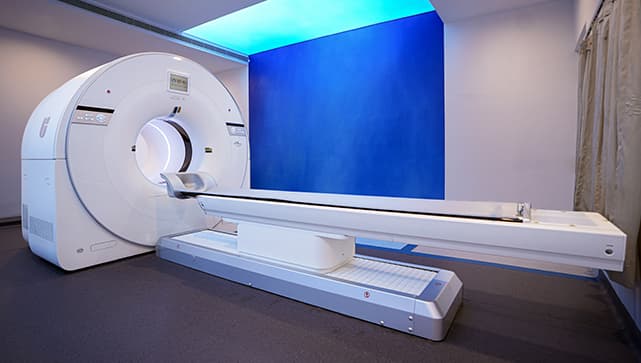
Digital PET CT (AI) With 320 Slice CT
Omega Hospitals is known for launching India's first & only Adaptive Intelligence (AI) powered digital PET-CT technology. A digital PET-CT (Positron Emission Tomography-Computed Tomography) scan is a highly advanced medical imaging technique combining two imaging modalities, PET and CT.
This hybrid imaging approach is a crucial diagnostic and prognostic tool that provides comprehensive and exact details about the structure and function of tissues and organs. It is widely used in medicine for various diagnostic and staging purposes, particularly in oncology, cardiology, and neurology.
The latest digital PET-CT scanners have in-built adaptive radiotherapy for diagnosis, differential diagnosis, and cancer staging. With digital PET-CT dual-modality configuration, it is possible to understand the disease progression better and detect smaller lesions at lower PET isotope doses.
A digital PET-CT scan's features include:
Simultaneous Acquisition:
Digital PET-CT scanners are advanced medical imaging devices that combine the capabilities of both PET and CT scanners in a single machine. With the ability to acquire both PET and CT images during the same examination, these scanners eliminate the need for separate scans and ensure that the images are perfectly aligned.
PET-CT Scans allow medical professionals to obtain high-quality, detailed images of a patient's internal organs, tissues, and bones, enabling them to make more accurate diagnoses and treatment plans.
Anatomical Correlation:
Integrating functional data from Positron Emission Tomography (PET) and precise anatomical information obtained from a Computed Tomography (CT) scan provides a comprehensive understanding of the body's nature, location, and extent of abnormalities.
By combining these two imaging techniques, healthcare professionals can accurately identify the metabolic activity of abnormal cells or tissues and map their precise location relative to surrounding structures. This information is vital for diagnosing disease, planning interventions, and monitoring treatment response.
Enhanced Diagnostic Accuracy:
Digital PET-CT scans deliver sufficient information about the structure and function of organs and tissues. By combining the data from a positron emission tomography (PET) and computed tomography (CT) scan, these advanced imaging techniques enable oncologists to understand a patient's condition better.
This is particularly important in the case of cancer staging, where the ability to locate and characterise tumours precisely is crucial for effective treatment planning. With the information provided by PET-CT scans, doctors can come to a final diagnosis and deliver effective personalised cancer care, considering each patient's unique needs and circumstances.
Planning for Radiation Therapy:
Digital PET-CT is a valuable tool for planning radiation therapy in cancer patients. This high-performance medical imaging technology helps oncologists accurately identify the target volume of tumours, determine the most effective radiation dose, and minimise the risk of unnecessary radiation exposure to healthy tissues.
Overall, digital PET-CT is an indispensable tool that assists medical professionals in developing personalised treatment plans tailored to each patient's specific needs.
Examining Treatment Response:
Digital PET-CT scans are a modern diagnostic method that combines both PET and CT technologies to generate comprehensive body images. These scans are especially beneficial for monitoring the response to cancer treatments.
By using PET-CT scans, healthcare providers can accurately evaluate the effectiveness of a therapy and make necessary adjustments to the treatment plan.
Reduced Radiation Exposure:
A PET-CT scan is a modern imaging technique that uses a radioactive tracer to create detailed images of the inside of the body. While CT scans use X-ray radiation to produce pictures, PET-CT scans typically require fewer X-ray exposures, resulting in a lower overall radiation dose.
This is because PET scans use a tracer that emits positrons detected by a special camera to create images, rather than relying solely on X-rays. As a result, PET-CT scans offer a safer and more accurate diagnostic tool for various medical conditions.
The various advantages of digital PET-CT scan are:
- 1. The first and only digital PET-CT in India
- 2. Adaptive Intelligence technology (AI)
- 3. Comprehensive and accurate digital imaging
- 4. Superior and sharp-quality images
- 5. 65% less radiation exposure
- 6. Precise and valuable information about tumours
- 7. Can detect tumours less than 3mm compared to 8mm in traditional PET-CT.
- 8. 3 times faster than traditional PET-CT
- 9. Scan all body types irrespective of physical characteristics.
- 10. Reports by the best Nuclear physicians in India.
